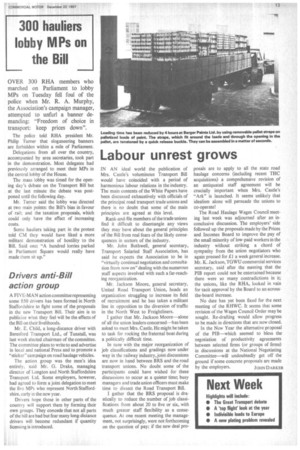Labour unrest grows
Page 15

If you've noticed an error in this article please click here to report it so we can fix it.
IN AN ideal world the publication of Mrs. Castle's voluminous Transport Bill would have coincided with a period of harmonious labour relations in the industry. The main contents of the White Papers have been discussed exhaustively with officials of the principal road transport trade unions and there is no doubt that some of the main principles are agreed at this level.
Rank-and-file members of the trade unions find it difficult to disentangle any views they may have about the general principles of the Bill from real fears of the likely consequences in sectors of the industry.
Mr. John Bothwell, general secretary, Transport Salaried Staff Association, has said he expects the Association to be in "virtually continual negotiation and consultation from now on" dealing with the numerous staff aspects involved with such a far-reaching reorganization.
Mr. Jackson Moore, general secretary, United Road Transport Union, heads an organization struggling w increase its field of recruitment and he has taken a militant line in opposition to the diversion of traffic in the North West to Freightliners.
I gather that Mr. Jackson Moore—alone of all the union leaders concerned—has been asked to meet Mrs. Castle. He might be taken to task for rocking the fraternal boat during a politically difficult time.
In tune with the major reorganization of job classifications and gradings now under way in the railway industry, joint discussions are now in hand between BRS and the road transport unions. No doubt some of the participants could have wished for these discussions to occur at a quieter time; busy managers and trade union officers must make time to dissect the Road Transport Bill.
I gather that the BRS proposal is drastically to reduce the number of job classifications from about 20 to five or six, with much greater staff flexibility as a consequence. At one recent meeting the management, not surprisingly, were not forthcoming on the question of pay; if the new deal pro
posals are to apply to all the state road haulage concerns (including recent THC acquisitions) a comprehensive revision of an antiquated staff agreement will be crucially important when Mrs. Castle's "Ark" is launched. It seems unlikely that idealism alone will persuade the unions to co-operate!
The Road Haulage Wages Council meeting last week was adjourned after an inconclusive discussion. The employers' side followed up the proposals made by the Prices and Incomes Board to improve the pay of the small minority of low-paid workers in the industry without striking a chord of sympathy from the union negotiators who again pressed for a week general increase. Mr. K. Jack son, TGWU commercial services secretary, said after the meeting that the PIB report could not be entertained because there were so many contradictions in it; the unions, like the RHA, looked in vain for tacit approval by the Board to an acrossthe-board increase.
No date has yet been fixed for the next meeting of the RHWC. It seems that some revision of the Wages Council Order may be sought. Re-drafting would allow progress to be made in directions that are now closed.
In the New Year the alternative proposal of the PIB—which seemed to bless the negotiation of productivity agreements between selected firms (or groups of firms) in discussions at the National Negotiating Committee—will undoubtedly get off the ground if some concrete proposals are made by the employers. JOHN DARKER




















































































